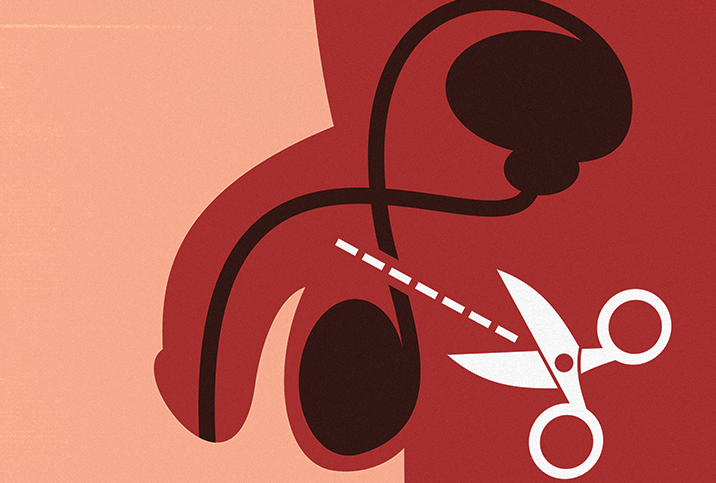Please Stop Believing These Cellphone/Male Fertility Inaccuracies

Deep in the back of men's minds is a long-established list of items to always keep away from their private parts: Zippers. Scissors. Power tools. Cellphones?
Ah, that's a big question mark after cellphones because a lot of conflicting information—and misconceptions—exists about their supposed health hazards. Since cellphones became commonplace in the 1990s, the possible effects of a phone's radiofrequency electromagnetic field (RF EMF) on a user's health have generated tremendous debate.
Cellphones use radiofrequency energy, a type of non-ionizing radiation, to send and receive signals. Questions persist over whether this radiation causes health problems, including cancer. Of course, cellphones are frequently found in people's pockets, and one particular area of concern is whether carrying a cellphone in the front pants pocket poses a risk to fertility for men.
The word from doctors and authoritative organizations indicates the risk is more theoretical than factual. So please stop believing these inaccuracies.
Inaccuracy #1
Radiation from cellphones damages semen
RF radiation is at the low end of the electromagnetic spectrum, meaning it is not strong enough to damage DNA directly. Nonetheless, preliminary studies in the early 2000s suggested a possible link between cellphone use and poor semen quality and, consequently, infertility. However, studies performed on humans were scarce then, and even today, various studies on the subject often contradict one another.
The issue of RF EMF effects from cellphones on sperm parameters is controversial, acknowledged Neel Parekh, M.D., a clinical assistant professor and male infertility specialist with the Cleveland Clinic Foundation. But he's clear in his viewpoint.
"There are no conclusive human studies that prove a risk to male fertility," Parekh said. "While semen analysis is the best test we have to predict male fertility, it is highly variable. The variation in semen parameters on a daily basis can be accounted for in the variation in sperm parameters [found in] previous studies on cellphone use. There are also a number of environmental and medical issues that can confound the situation."
Inaccuracy #2
Carrying a cellphone in your pocket affects your ability to conceive
One research team conducted a meta-analysis, which was published in April 2021 in Human Reproduction journal. The team found little overall association between carrying a phone in the front pants pocket and a man's ability to conceive, or fecundability, which is defined as the probability of achieving a pregnancy within one menstrual cycle.
Interestingly, the analysis found some differences depending on a man's body mass index (BMI), which is a measure of body fat based on height and weight. Leaner men had lower fecundability. In other words, there was a moderate inverse association between front-pants-pocket cellphone exposure and fecundability among men with a BMI of less than 25, but not among men with a BMI equal to or greater than 25, which is considered overweight.
Inaccuracy #3
Exposure to a cellphone decreases sperm volume and movement
The 2021 meta-analysis also found no effect from cellphones on sperm quality parameters. There were few consistent associations between cellphone exposure and semen volume, concentration or motility (movement).
Individual studies, however, have drawn different conclusions. A 2014 study suggested a correlation between mobile phone radiation exposure, DNA fragmentation and decreased sperm motility. However, this study included only 32 men.
A 2020 review of both human and animal studies also found sperm exposed to electromagnetic radiation emitted by mobile phones had reduced motility, more structural anomalies and increased oxidative stress. Still, this review concluded the biological effects remain undetermined because most studies examining electromagnetic radiation have been conducted on rats.
Inaccuracy #4
Men should be worried about cellphones as a factor in fertility
Parekh said patients occasionally ask him about the perceived dangers of cellphone use on fertility, and he tries to allay their fears.
"While it doesn't hurt to keep a cellphone out of your front pocket, I would not focus on the unlikely impact on sperm and fertility," he said. "It is much more important to discuss known causes of subfertility with patients. I counsel patients to avoid sitting with a laptop on their lap [which increases heat in the testicles], weight loss/exercise, diet and smoking cessation."
Chris Kyle, M.D., M.P.H., a urologist practicing at Springfield, Oregon, agreed that men concerned about fertility shouldn't fixate on cellphones.
"I will tell them to focus on proven techniques for improving their health and their sperm quality rather than worry about theoretical possible dangers," he said. "Until we have more evidence, there's no need to change [cellphone] behavior."
Men should focus on evidence-based behaviors, such as regular exercise, adequate sleep, a healthy diet and stress management, he said.
"I think the payoffs of these behaviors are much more likely to improve a patient's health and, therefore, their sperm quality rather than limiting their cellphone usage or where they store it in their clothes," Kyle said.
The final word
Let's revisit the bottom-line question: Do cellphones pose a risk to male fertility?
"I don't think we know the answer to that question just yet," Kyle said. "My impression is likely no. I think the risk is largely theoretical."
"My impression is that there is inadequate data to confirm negative effects of cellphones on male fertility," added Barry Witt, M.D., an associate professor of clinical obstetrics, gynecology and reproductive sciences at Yale School of Medicine.
Cellphones are still in their relative infancy, and health studies on humans remain somewhat scarce. But at this time, no definitive causal link between mobile phones and male fertility is established.
Safeguards are in place, as well. The Federal Communications Commission has adopted guidelines that limit RF energy exposure, and all cellphones must comply with these guidelines. The FCC and other governmental organizations, including the Food and Drug Administration and the Environmental Protection Agency, do not cite cellphones as a health hazard. The Centers for Disease Control and Prevention, on its website, states: "At this time, we do not have the science to link health problems to cellphone use."
So, if you're concerned about fertility, rest assured that your cellphone's energy is not zapping your sperm's.


















